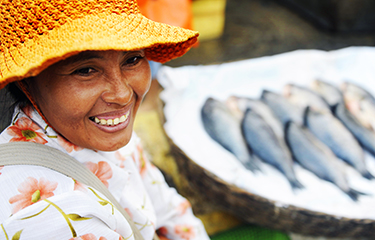A recent benchmarking study by WSI, the International Association for Women in the Seafood Industry, found that seafood supply companies underperform significantly when it comes to gender equality compared to public-facing companies in retail, foodservice, and hospitality.
The organization has long suspected that there is disparity within the supply chain in the way that seafood companies relate to and act upon gender issues, WSI Executive Director Marie Christine Monfort told SeafoodSource.
In late 2020, the organization undertook a benchmarking study of 53 large-scale seafood stakeholders to measure the intensity of their gender focus policy and actions. WSI was pleased and disappointed in equal measure by the results, which showed far better performance by consumer-facing companies than their suppliers along the value chain.
“It is clear from the analysis that gender equality has reached the consciousness of retailers and wholesalers, who performed well across all the parameters measured. Seafood companies, on the other hand, had consistently lower scores, and clearly much work needs to be done to ensure that the importance of gender inclusion and equality is understood,” Monfort said. “It is possible that measures are taken within companies, but that this is not reflected in their reports and on their websites. If this is the case, there is a need to communicate the importance of companies promoting their gender inclusivity.”
The study looked at how the seafood industry addresses gender equality and sought to identify best practices on gender equality performance, reporting, and communication. The information was gathered from publicly available information on company websites between June and October 2020, and was based on current reporting frameworks such as those used by the Dow Jones Sustainability Indexes, the Asian Seafood Improvement Collaborative, GRI Standards, the Sustainability Accounting Standards Board, and SDG 5 – the United Nations' Sustainable Development Goal on Gender Equality.
The reach of the study was broad in terms of both supply-chain sector and geography, and covered companies in 19 countries, from Australia to the United States, many of which operate worldwide. In the study, WSI analyzed the performance of 37 major seafood producers and processors, 10 retail and wholesale chains, three aquaculture feed companies, and three large foodservice companies.
Five main areas were addressed in the analysis of publicly available information: gender equality policies, action plans, targets, and achievements; monitoring indicators; gender diversity governance; external stakeholder engagement on gender issues; and how gender equality is promoted and communicated internally and externally.
"Key findings reinforced the need for the seafood industry to improve management practices globally. Almost half (43 percent) of the seafood companies list no gender content on their websites or in company reports, indicating strongly that they do nothing in this field. The remainder somehow communicate about gender equality, but less than one third (30 percent) take real action. Feminism-washing, where there is a gap between discourse and reality, is on its way," Monfort said.
On the positive side, 100 percent of the retailers, wholesalers, aquaculture feed producers, and hospitality and foodservice companies analyzed are going beyond their policies and codes of conduct to implement meaningful action measures to bring gender parity into the workplace, Monfort said. This figure compares with just 57 percent of seafood companies along the value chain.
But gender equality is not front and center in companies’ reporting structures and is mainly disclosed under sustainability, as seen from a social perspective. Few seafood companies are making SDG 5 a priority, Monfort said.
In the retail category, Walmart, Sainsbury’s, and Metro came in first, second, and third place, respectively, in terms of the number of gender-related activities reported, and Sodexo and Compass took the top two slots among foodservice companies.
“By sharing our research findings, we hope to provide a wake-up call for the global seafood industry, and to act as both a catalyst and an accelerator for change, to ensure that the importance of women in society and in the workplace is acknowledged and celebrated,” WSI Chairwoman Christelle Vigot said.
WSI will now use the benchmarking report to invite retailers, wholesalers, and foundations to work together to develop gender risk-management assessments and seafood sourcing policies that integrate gender equality commitments.
Some consumer-facing companies, including Walmart, Kroger, and Metro Group, are already starting to specify the adoption of new gender equality commitments in their suppliers’ code of conducts. A further aim of WSI is to identify potential partnerships with NGOs focussed on the equality and empowerment of businesswomen.
"The results of this study remind us of the sustainability debate of 20 years ago. At that time, sustainability of marine resources was seriously taken into account by consumer-facing companies in the retail and hospitality sector, but negligibly by producers. We are confident that industry stakeholders will now wake up to gender issues in the same way they did for environmental ones. Consumer and employee confidence is at stake," Vigot said.
The full analysis, which provides a detailed breakdown of the benchmarking study results, is available from WSI.
Photo courtesy of Rawpixel.com/Shutterstock







